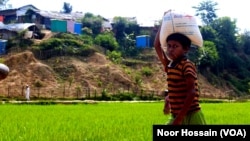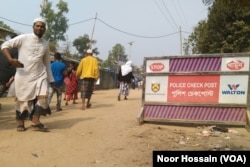Rights activists are voicing concern for the well-being of Myanmar Rohingya refugees living in Bangladesh after the United Nations warned of cuts to refugees' food rations due to a shortfall in international donations.
The U.N.’s World Food Program recently announced that, as of Wednesday, the monthly allowance for each refugee will be reduced from $12 to $10 per month — a decrease of 17%. The U.N. said it urgently needs an additional $125 million to avoid deeper cuts in April.
"Many Rohingya fled genocidal attacks more than five years ago and need reliable support, not cuts to the food on which they depend," John Quinley, director of the investigative group Fortify Rights, told VOA.
"Rohingya we spoke with after hearing of the cuts in aid expressed fear about the future,” he said. "The cuts on food aid will be dire and could lead to significant health consequences for Rohingya refugees in Bangladesh."
Mohammad Shukur is a Rohingya living in Bangladesh’s Cox’s Bazar area.
"With the price of some food materials steeply rising in the past one or two years; we have already been facing difficulties," he said, speaking to VOA in the Rohingya language. "Now if the WFP [food assistance] voucher value is reduced from 1,224 takas [$12] to 1,020 takas [$10] per person, we will be met with greater hardship."
Refugees get most of food from WFP
Upwards of 1 million Rohingya Muslims live in the congested bamboo and tarpaulin shanties of the world’s largest refugee settlement in Cox’s Bazar district. Many fled Buddhist-majority Myanmar in 2017 to escape a crackdown that followed attacks on military personnel by an insurgent group. Myanmar has denied accusations of genocide.
The refugees are not allowed to leave the strictly guarded camps or work, and they are almost completely dependent on food aid provided by the WFP.
Rohingya refugees in the camps say the food aid they receive is already very limited; they survive on staples such as rice, lentils and oil, and most suffer from malnutrition.
"The $2 reduction per head count will have serious repercussions for each refugee family. So far, we have eaten fish or chicken once or twice a month. Now, after the cut, we won’t be able to buy fish or chicken at all," Mohammed Rezuwan Khan, a Rohingya social activist in Cox’s Bazar, told VOA.
"While the value of the food ration voucher has not increased, prices of many food materials have doubled in the past two-and-a-half years. The food ration assistance is being cut at a time when the refugees were praying for its increase, to cope with the growing inflation and poverty-triggered sufferings."
Noor Qadr, a Rohingya teacher in Cox’s Bazar, said the cut in WFP food assistance would have a negative impact on the health of the refugees.
"When the refugees are not allowed to go out of the camp, work in local villages and earn some money for their families, the cut in WFP food assistance comes as a very big blow to the entire Rohingya community," Qadr told VOA. "Apart from food, we also need money for some medical needs, clothing, the maintenance of children, and others. Most Rohingya are going through a severe hardship not being able to earn anything by doing some work."
‘Livelihood restrictions should go’
U.N. officials agree the repercussions of the cuts in food assistance will be massive for the Rohingya community in Bangladesh.
"If these cuts are made, they will be imposed on vulnerable people who are already food insecure," U.N. officials Tom Andrews and Michael Fakhri said in a statement. "Acute malnutrition levels remain high and chronic malnutrition is pervasive among the Rohingya refugee population in Bangladesh, with more than a third of children stunted and underweight."
Quinley, of Fortify Rights, said Dhaka’s restrictions on refugees' rights — including livelihood restrictions — are not the answer.
"The Bangladesh government needs to support middle-term solutions for the Rohingya, including access to work and freedom of movement," he said.
Government reluctance
Citing domestic reasons, the government said it is not in favor of lifting the livelihood-related restrictions for the Rohingya.
"Bangladesh is a densely populated country which is economically not that strong. We already have surplus manpower in the country. In such a situation, if our laborers are pushed out of the job market because of the Rohingya, it will create great social tension and the law and order situation will deteriorate," Mohammad Mizanur Rahman, the refugee relief and repatriation commissioner, told VOA.
"It will not be good for the Rohingya to be caught in such a conflict with the host nation, either…for the sake of the well-being of the Rohingya, and maintenance of law and order they are not allowed to work outside the camp."
The employment of Rohingya in Bangladesh would enhance their integration into the local society which in turn would frustrate their process of repatriation to Myanmar, the commissioner said. The government’s agenda, he said, "is not integration, but repatriation."
Noting that WFP's announced cuts to food rations for Rohingya refugees deal “a severe blow to their ability to survive,” Daniel Sullivan, director for Africa, Asia, and the Middle East at Refugees International, said that they are coming at a time of "rising insecurity in the camps and little prospect for safe return to Myanmar as the military junta continues to wreak havoc there."
"The sad part is that this is something Bangladesh and the international donor community should have seen coming. They should have extended education and livelihood opportunities to the refugees to allow them to build their own resiliency," Sullivan told VOA.
Donor fatigue, competing crises, and the economic effects of the conflict in Ukraine on commodity prices have all set the stage for this crisis, he said.
"But it's not too late," he said, "And as the displacement crisis continues, the time to allow those opportunities for self-reliance for Rohingya refugees is now. The United States and other leading donors should also hold a global pledging conference for the Rohingya and broader needs in Myanmar."






